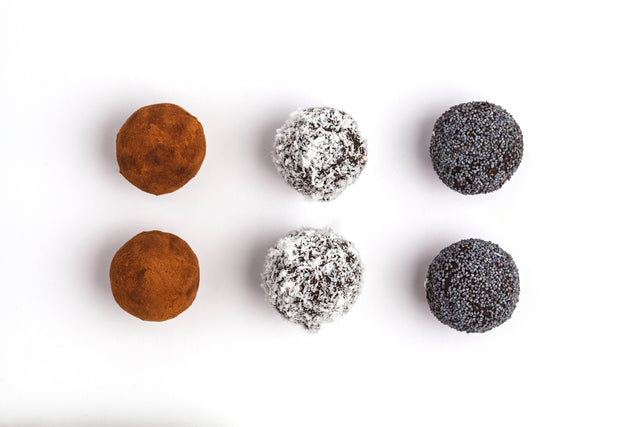Carbohydrates provide the vital energy you need to power through the extensive miles you put on the pavement each week. Carbs may be vilified for the average gym-goer, but for you, carbs provide the fuel you need to crush through your training without hitting a wall. We’re going to talk about how to properly carb load, so you can outpace your competition.
How Does Carb Loading Improve Performance?
If you’re a long-distance runner, rower, or cycler then you know carb-loading the night before a race, is crucial in order to provide the long-lasting and sustained energy your body requires. Running 26+ miles is a lot of ground to cover, and if you’re not fueled, you’ll gas early, and get dusted by the competition.
Carbohydrates are your bodies' primary source of energy (also known as glucose and stored as glycogen). The amount of carbohydrates your body needs depends on the intensity and duration of the activity. The longer the activity and the higher the intensity, the more carbohydrates and glycogen are used as an energy source.
Running with optimal glycogen stores will improve stamina, promote endurance, improve energy, and promote cognition during training day. When you carb load and eat spaghetti, mashed potatoes, or a whole loaf of banana bread, you are storing glycogen in your muscles liver, and bloodstream. Glycogen is an easily accessible form of energy. As you exercise, glycogen is utilized as the main fuel source, followed by liver glycogen and blood glucose.

Most endurance athletes train around 65-70% at VO2 max capacity. Muscle glycogen can be depleted within 2 hours of exercise, with liver glycogen depleted with a 15 hour fast. Therefore, by consuming an adequate amount of carbs athletes can delay onset muscle fatigue caused by glycogen depletion.
Elite athletes will normally carb load a few days in advance before a race to help store a large amount of muscle glycogen. If done properly, studies have shown that carb-loading can have a significant benefit on training performance. The main goal of a long-distance runner is to have enough energy to last the entire race and delay muscle fatigue as much as possible.
RELATED ARTICLE 5 Reasons Why You Need More Carbs
How Many Carbs Do I Need?
Carb loading strategies vary in characteristics from athlete to athlete, regarding type of carbohydrates and the intensity and duration of activity or training, which will determine the carb-loading period. Having versatility in carb loading strategies, allows greater flexibility in pre-competition prep. Carb loading strategies should exceed 8-10g per kg of lean body mass [R]. Carb loading can last and store muscle glycogen content for up to 5 days, when loaded at maximum levels.
For example, if you weigh 154 pounds (70 kg) and you normally eat 300 grams of carbs per day, then you are consuming 1.9 grams per pound (4.2 grams per kg) of carbs per day. An endurance or elite level athlete should be consuming closer to 10g per kg per day, which would be to 1540 g of carbohydrates per day. Sounds like a lot, right? That’s because it is.

A study published in the journal Sports Medicine stated that moderate endurance training lasting less than 90 minutes, carb-loading has minimal effect on performance measurements. However, elevated muscle glycogen content will postpone fatigue by approximately equal to 20% in endurance events lasting more than 90 minutes [R]. During long-distance training, exhaustion is directly correlated with critically low muscle glycogen content. Therefore, high carbohydrate diets, for endurance athletes, can improve performance.
Carbohydrate loading can almost double muscle glycogen content, which translates into better performance and better endurance potential. Typical carb loading strategies for elite athletes, last a 6-day window. The first three days usually consist of a mixed diet, with the last three focused on carb loading. Thus, Day 1-3 should consist of 5-7g per kg of body weight per day, as day 4-6 should progress into 10g+ before day of competition.
What Carbohydrates Are Best For Carb Loading?
Runners, unlike other athletes don’t need to be as restrictive with their diets, as a someone who is trying to achieve an optimal body composition. Of course, there are better and healthier carb choices than others, but running long-distances requires more calories and more fuel to keep up with your body’s energy demands. The best choices are the easily digestible carbs, that provide long-lasting sustained energy, such as the ones below.
RELATED ARTICLE Simple Vs Complex Carbs: What’s The Difference?
| POTATOES (Sweet or Golden) |
| OATS |
| SPAGHETTI SQUASH |
| RICE (White or Brown) |
| Clean Carbs® (Sweet Potatoes, Yams, Oats, Blueberries) |
| PASTA (White or Wheat) |
| CARBOHYDRATE DRINKS |
RELATED ARTICLE The Best Carb Sources To Improve Performance
Supplementing Carbs During Training (Intra-Workout)
Supplementing with carbohydrates during training, or on race day, will ensure delayed muscle fatigue, and promote better endurance and long-lasting sustained energy. By supplementing carbs intra-workout, you’ll have a better chance of overcoming your wall. Intra-workout carbs provide a rapid uptake and fuel source to improve performance. Energy gels, chews, and electrolyte drinks with higher sugar content will provide a short burst of energy, which can be extremely beneficial on race day. Complex carb drinks, such as Swolverine’s Clean Carbs, is also the perfect intra-workout carb source, to help provide energy to overcome the wall of fatigue. Unlike nearly all other carb sources, which use simple sugars like maltodextrin, and dextrose, Swolverine's Clean Carbs® are made with 100% real whole-superfoods from complex carbohydrates, including Sweet potatoes, Yams, Oats, and Blueberries. These four ingredients provide the long-lasting and sustained energy your body needs to fuel performance and optimize recovery.
RELATED ARTICLE Should You Take A Carb Supplement?
Should You Carb Load? Takeaway
To recap, carbohydrates are crucial for endurance athletes. Carbs not only provide the long-lasting sustained energy you need to improve performance, boost endurance, and overcome the dreaded wall of fatigue, but also reduce mental fatigue to crush your competition. So if you’re running more than 90 minutes, long-distance, or plan on crushing a marathon, start carb loading. Typically carb loads strategies should be planned one week in advance. Otherwise, you’ll gas early and out.
Ready To Add Some Complex Carbs To Your Diet?
Your body needs carbohydrates for optimal performance and recovery during high-intensity and endurance training. But, not all carbohydrates are created equal. Swolverine's Clean Carbs is made with 100% natural whole-foods from complex carbohydrates, including Sweet potatoes, Yams, Oats, and Blueberries to provide the long-lasting and sustained energy your body needs to fuel performance and optimize recovery. Delicious and rich you can add it to your smoothies, shakes, or mix with water, for a rich and tasty treat.
SWOLVERINE IS AN ENDURANCE ATHLETE AND ACTIVE LIFESTYLE BRAND. MADE FOR THE ELITE ATHLETE, AND THE STRONG-WILLED OUR PRODUCTS WERE DESIGNED TO FUEL YOUR ATHLETIC PERFORMANCE. WE PERFORM WHEN YOU PERFORM.
We believe that everyone can optimize not only their athletic performance but their human potential. The way we believe we can optimize performance is through transparency, clinically effective doses, and clinically proven ingredients with evidence-based outcomes. We provide the nutrients you need to power your active lifestyle.
References
Sedlock DA. The latest on carbohydrate loading: a practical approach. Curr Sports Med Rep. 2008;7(4):209-13.
Hawley JA, Schabort EJ, Noakes TD, Dennis SC. Carbohydrate-loading and exercise performance. An update. Sports Med. 1997;24(2):73-81.
Åkermark, C., Jacobs, I., Rasmusson, M., & Karlsson, J. (1996). Diet and muscle glycogen concentration in relation to physical performance in swedish elite ice hockey players.
International Journal of Sport Nutrition and Exercise Metabolism, 6(3), 272-284. Retrieved from SCOPUS database. Burke, L. M. (2007). Nutrition strategies for the marathon: Fuel for training and racing. Sports Medicine, 37(4-5), 344-347. Retrieved from SCOPUS database.
Chen, Y., Wong, S. H. S., Xu, X., Hao, X., Wong, C. K., & Lam, C. W. (2008). Effect of CHO loading patterns on running performance. International Journal of Sports Medicine, 29(7), 598-606. Retrieved from SCOPUS database.
Hatfield, D. L., Kraemer, W. J., Volek, J. S., Rubin, M. R., Grebien, B., Gómez, A.L., et al. (2006). The effects of carbohydrate loading on repetitive jump squat power performance. Journal of Strength and Conditioning Research, 20(1), 167-171. Retrieved from SCOPUS database.







